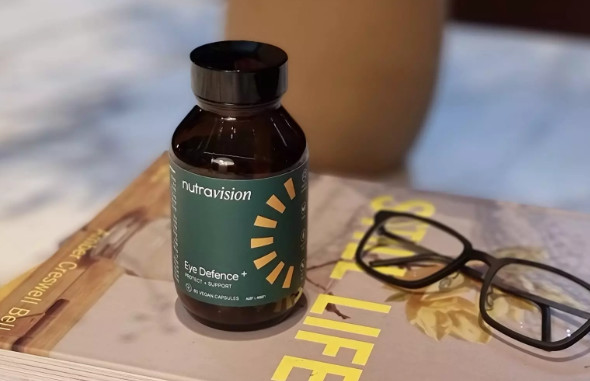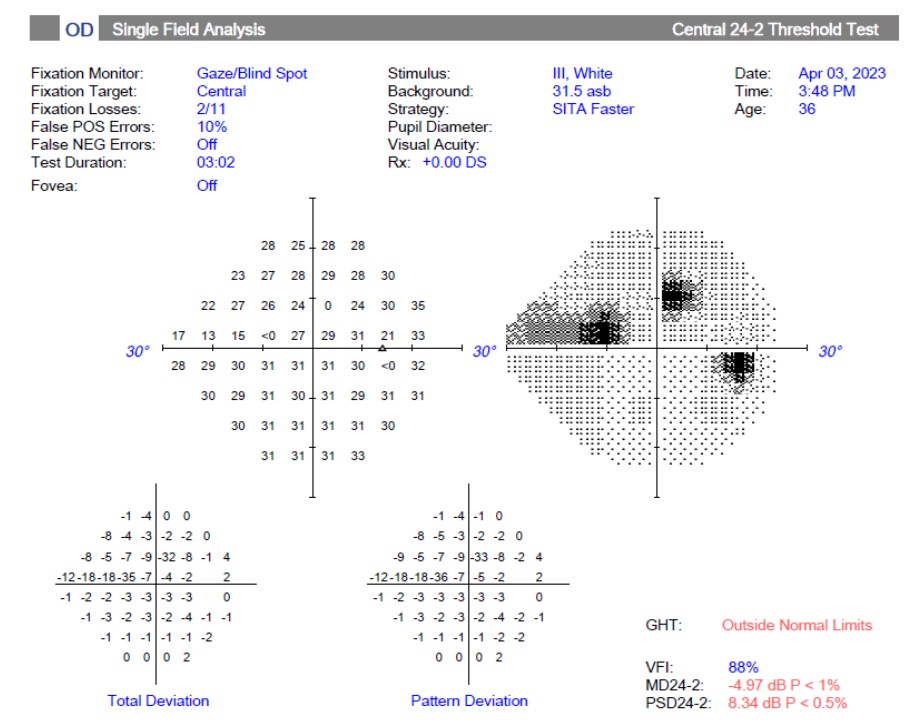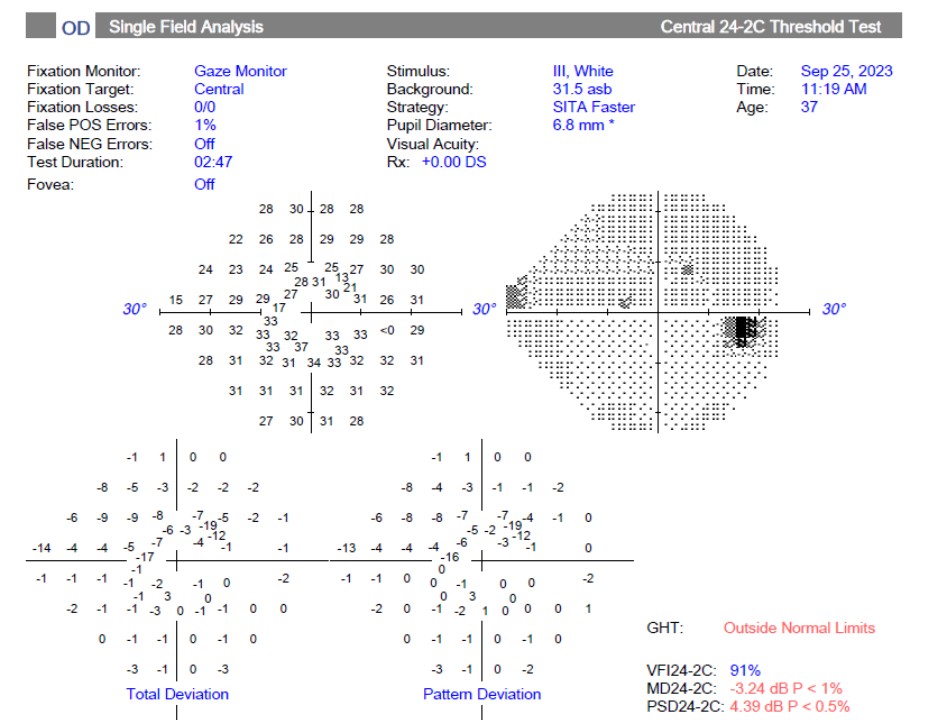Why is glaucoma neuroprotection important?
I previously highlighted glaucoma neuroprotection with nutrient supplements as a potentially contentious topic.
Ultimately, the goal of glaucoma treatment is to prevent glaucoma blindness, and everyone rightly emphasizes eye pressure as the most important risk factor to treat.
But no one emphasizes that glaucoma progression can still occur despite the best controlled eye pressures.
And there is almost no emphasis on addressing the other nine important biocellular mechanisms of eye ageing that contribute to glaucoma:
- Oxidative stress
- Chronic inflammation
- Neuronal transmission failure
- Impaired glucose metabolism
- Mitochondrial dysfunction
- Vascular dysregulation
- High homocysteine levels
- Stress-related cellular damage
- Macular pigment deficiency
If we do not provide the necessary nutrients to combat these biocellular mechanisms, how can we expect the eye and optic nerve to be more resilient against insult and to recover better when damage has occured?
For the best chance of preventing glaucoma blindness, you must successfully treat your eye pressure and effectively neuroprotect against these biocellular processes of aging.
My professional opinion therefore is that neuroprotection and neuroenhancement are essential components of proactive glaucoma care, alongside conventional medical and surgical therapies.
What are the best glaucoma vitamins and supplements?
Many nutrients, botanical extracts, and vitamins have been investigated as a potential neuroprotective treatment for glaucoma. However, only some have shown promise.
This is unsurprising because the targeting is not comprehensive or complete enough. Most of these nutraceutical supplements only target at most up to three of the biocellular risks listed above.
If you have a roof that is leaking from ten holes and you only patch three of them, your roof is not going to stop leaking.
So the best glaucoma supplement to take is one that provides truly comprehensive neuroprotection by tackling all the important biocellular risks that contribute to glaucoma progression.
In this post, I list my top 6 glaucoma supplements for neuroprotection to optimize your optic nerve health, as part of a holistic, proactive glaucoma care approach.
However, if you prefer taking individual glaucoma supplements separately, the ones that I suggest are: bilberry-maritime pine bark combination, citicoline, ginkgo biloba, palmitoylethanolamide (PEA), and vitamin B3 (nicotinamide).
1. Nutravision (Australia)
(Disclaimer: I am part of the team of leading Australian clinicians, scientists and naturopaths that formulated and developed Nutravision)In my admittedly biased opinion, Nutravision is the best glaucoma supplement currently available globally.
It is the first vision formula that delivers ultimate neuroprotection by tackling all the nine important biocellular mechanisms of eye aging (ten if you include elevated eye pressure).

This is achieved by combining quality assured ingredients that have already been individually clinically proven to deliver significant outcomes in individuals with glaucoma:
- Bilberry & grape seed: reduce eye pressure and blood pressure, increase ocular blood flow, and improve visual function.
- Ginkgo biloba leaf: enhances ocular microcirculation, promotes cognitive function, and either improves pre-existing visual field loss or slows the progression of visual field damage in low pressure glaucoma.
- L-methylfolate & methylcobalamin: Both are essential for maintaining the myelin sheath that protects the optic nerve. They also aid in reducing homocysteine levels in the blood, an amino acid that is associated with pseudoexfoliation glaucoma, cardiovascular disease and cognitive decline. Long-term intake of methylcobalamin has been shown to decrease visual field deterioration in low pressure glaucoma.
- Lutein & zeaxanthin: These macular carotenoids shield the eye from harmful UV and blue light. Although mainly taken for macular degeneration, they have also been clinically proven to increase macular pigment optical density and contrast sensitivity in eyes with glaucoma.
- Nicotinamide & pyruvate: Important as support against mitochondrial dysfunction and impaired glucose metabolism in retinal ganglion cells. A clinical trial from the United States found that nicotinamide combined with pyruvate improved visual function in moderate glaucoma after two months.
- Saffron: modulates the stress response of the body, and further decreases eye pressure in individuals with stable, treated glaucoma.
So when taken together, what you get with Nutravision is quite simply the most comprehensive neuroprotection supplement for glaucoma currently available worldwide.
Below is a simple case example of someone taking Nutravision for glaucoma neuroprotection alongside his usual eye drops:

The visual field above shows 88% of the visual field remaining, with two typical blind spots above the horizontal midline (the blind spot on the right below the horizontal midline is normal; everyone has it).
This is typical of how glaucoma causes peripheral vision loss.
In this particular case, he has been using eye drops since his glaucoma was diagnosed a few years ago. The eye drops stabilized his eye pressures and prevented his visual field defects from getting worse.
When Nutravision was launched, he started taking one capsule daily on top of continuing with his usual glaucoma treatment. He wanted to take proactive action to not just stabilize his glaucoma but also to potentially improve his visual function.
As a busy professional, it was more convenient and saved him time to take one Nutravision capsule daily rather than to purchase and take the 10 individual ingredients separately.
This was what he achieved with his visual field result three months later:
- Increase in visual field to 91%, and
- Decrease in his glaucoma blind spots.

This is a phenomenal outcome that highlights why all glaucoma patients should consider supplements for proactive glaucoma neuroprotection alongside their conventional treatments.
Please note that individual results to supplementation will vary, and not everyone will achieve similar outcomes from taking Nutravision or any other formula for glaucoma neuroprotection.
2. Bilberry-maritime pine bark combination
The phytonutrient combination of bilberry fruit extract and maritime pine bark extract taken orally has shown significant eye pressure reduction in randomized clinical trials.
A trial published in 2008 found that after three months of treatment with bilberry-maritime pine bark, the eye pressure decreased by an average of 3 mmHg, in almost all (19 out of 20) subjects). There was no change in pressure in the control group.

The combination of bilberry-maritime pine bark with latanoprost eye drops achieved better pressure reduction than either alone, from 38 mmHg to 24 mmHg, after six weeks.
Possible alternative:
Some have asked me if there is an alternative supplement to the bilberry-maritime pine bark combination, and the answer is yes.
The beneficial effects of this combination are due to anthocyanins from bilberry and proanthocyanidins from maritime pine bark.
If maritime pine bark is difficult or too expensive to source, then another excellent source of proanthocyanidins is grape seed extract. In fact, grape seed extract is the best natural source of proanthocyanidins, containing even more of these amazing antioxidants than maritime pine bark (95% vs 80%).
It is logical that a natural botanical supplement containing bilberry combined with proanthocyanidins, whether from maritime pine bark or grape seed, should elicit equivalent beneficial clinical effects for glaucoma.
See Related: Bilberry-maritime pine bark combination for glaucoma
3. Citicoline (CDP-choline)
Citicoline is a compound that is naturally found in our brain. It enhances communication between nerve cells, protects neural structures, and supports healthy brain activity. It has been studied extensively for its potential benefits for neurodegenerative conditions, such as Alzheimer’s disease.
Citicoline has been authorized as a food supplement in the United States and in the European Union. The Italian Ministry of Health has approved citicoline as a supplement for special medicinal purposes in glaucoma patients.
Oral citicoline 500 mg (in the form of a solution) was able to significantly slow down progression of glaucoma when taken over a period of 2 years. A separate trial found that glaucoma patients who took 500 mg oral citicoline daily showed improvements in visual field and nerve thickness measurements after 12 to 18 months.
Some have asked me if there is an alternative to citicoline because it is currently not approved for sale in Australia. While there is no best direct replacement, the activated form of vitamin B12 (methylcobalamin) is a useful alternative.
Like citicoline, methylcobalamin is important for healthy functioning of the nervous system, protects neural structures, and supports healthy brain activity.
See Related: Citicoline as a natural glaucoma treatment
4. Ginkgo biloba leaf
Ginkgo biloba leaf is a popular natural herb that has been used for centuries in Traditional Chinese Medicine. It contains a complex mixture of at least 37 phytochemicals in 2 main groups: flavonoids (which have antioxidant properties) and terpenoids (which reduce blood viscosity).

A trial published in 2003 found that for low pressure glaucoma patients, 40 mg of ginkgo biloba extract 3 times daily (120 mg total dose per day) taken for four weeks was able to improve pre-existing visual field loss.
A separate trial found that a ginkgo biloba blend (Optic Nerve Formula) taken 2 capsules twice daily for one month, significantly improved blood flow to the retina and optic nerve.
Note that there is some concern regarding bleeding with ginkgo biloba, but the most rigorous evidence from systematic reviews and meta-analyses have confirmed that ginkgo biloba does not increase bleeding risk.
See Related: Ginkgo biloba as a natural glaucoma treatment
5. Palmitoylethanolamide (PEA)
Palmitoylethanolamide is an endocannabinoid (or endogenous fatty acid amide) that is naturally produced throughout our body to reduce pain and inflammation in response to tissue damage and injury.
PEA is a similar-looking molecule to delta-9-tetrahydrocannabinol (which is the main active ingredient in marijuana). The great thing about PEA is that it has a lot of the benefits of cannabis but without any of the side effects. This means you won’t get addicted to PEA if you decide to take oral PEA supplements.
Similar to citicoline, PEA supplements have been approved in Italy and Spain as a food supplement for special medicinal purposes.
In 2011, a randomized clinical trial reported that for glaucoma patients using timolol eye drops, PEA taken 300 mg twice daily reduced eye pressure by an additional 16%. A separate clinical trial found that ultramicronized PEA 300 mg taken twice daily for 6 months reduced eye pressure and improved visual field parameters in patients with low pressure glaucoma.
Some ophthalmology departments in Italy already routinely recommend that their glaucoma patients supplement with both PEA and citicoline in addition to their usual glaucoma treatments.
See Related: Palmitoylethanolamide as a glaucoma treatment
6. Nicotinamide (Vitamin B3)
Vitamin B3 is a water-soluble vitamin, with nicotinamide being its active form. It plays an important role in supporting cell metabolism, mitochondrial health, and DNA repair.
In 2020, a world-first clinical trial conducted by the Centre for Eye Research Australia found that nicotinamide (Insolar) 3,000 mg daily improved the function of the optic nerve ganglion cells (measured using electroretinography) over six weeks.

A separate trial published in 2021 reported that in treated moderate open angle glaucoma patients, a combination of oral nicotinamide (1,000 to 3,000 mg) and pyruvate (1,500 to 3,000 mg) improved visual function test locations when taken over two months.
No serious adverse effects were reported with the nicotinamide-pyruvate combination.
In my clinical practice, I have been recommending vitamin B3 nicotinamide to my glaucoma patients but at lower dosages. This is because the 3,000 mg mega dose is not easily tolerated, and taking a lower dose of 500 mg daily will most likely yield the same result over the long term. This is the same with pyruvate.
See Related: Natural glaucoma treatment with nicotinamide (Vitamin B3)
Should I take supplements and vitamins to treat my glaucoma?
This is a decision that only you can make, together with your eye specialist, based on what is best for you. If you ask me which supplement is best for glaucoma, my biased opinion is that Nutravision stands head and shoulders above all others.
I recommend Nutravision to all my glaucoma patients for neuroprotection simply because it is the best and most complete neuroprotection supplement out there. It is a truly comprehensive natural solution for glaucoma that will enhance the effect of your existing glaucoma treatments.
Here are 3 reasons why Nutravision is trusted by industry experts and other eye care professionals:
- Superior efficacy. Nutravision is the only eye supplement formula in the world that tackles all the ten biocellular risks that cause glaucoma progression.
- Convenience. With Nutravision, the optimal dose for glaucoma is two capsules daily with food. Taking the nutrients separately means taking 8 to 10(!) pills and tablets every day.
- Reassurance. Nutravision uses practitioner grade, quality assured ingredients at clinical doses. There is no guesswork and all the hard work has been done. All one has to do is to remember to take the capsules daily.
Take Nutravision as part of holistic, proactive glaucoma care, where the focus is not just on treating eye pressure, but also on naturally restoring the health of the retinal ganglion cells and the optic nerve.
Remember that the purpose of glaucoma supplement nutrients is to complement, and not to replace, your existing glaucoma treatment. And please discuss with your eye specialist and family doctor first to avoid the unlikely scenario of adverse drug interactions and unwanted side effects.
See Related: Best vitamins for glaucoma & your optic nerve


